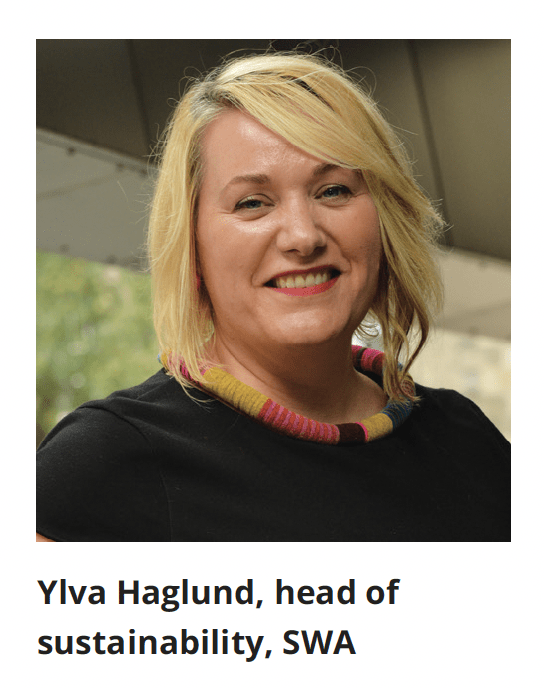Paul Hill looks at how the Scottish Wholesale Association (SWA) has developed its sustainability strategy over the past 18 months
Following the appointment of Ylva Haglund as head of sustainability in 2022, the SWA has further developed its sustainability programme, with priorities and actions noted in the ‘Decarbonising the Scottish Wholesale Sector’ report, which explores the sector’s carbon emissions and attitudes to climate action.
The report was launched alongside the UK Wholesale Sector Net Zero Roadmap, developed in collaboration with FWD, last year. SWA’s research for north of the Border identifi es key sources of operational greenhouse gas (GHG) emissions (Scope 1 and 2 emissions) for the sector as road transport – particularly HGVs – at 63.7%, followed by electricity at 17.7%, use of fuel to heat buildings at 8.6%, refrigerant leaks at 6.5%, and LGVs and cars at 3.4%*. The report also identifi ed a critical need to work together across the food and drink supply chain to reduce climate change emissions, as wholesalers are only directly responsible for approximately 4% of these in the operation of their businesses (referred to as Scope 1 and 2 emissions), with the majority in the chain upstream from manufacturers and suppliers (referred to as Scope 3 emissions).

In October, it was revealed that Edinburgh-based wholesaler Mark Murphy Dole has reduced its food waste by 33% after taking part in a collaborative project with SWA and Zero Waste Scotland.
The wholesaler embarked on the six-month project in autumn 2023, focusing on four steps to tackling food waste: assessing its existing food-waste data; measuring its food waste; analysing the fi ndings; and developing a plan of action. The project used Zero Waste Scotland’s One Month Challenge guidelines as a starting point. Despite making up only 0.2% of the total food passing through the depot, the fresh produce wholesaler’s fi ndings revealed an unexpected savings opportunity as the amount of food waste within the business over one month measured 1.62 tonnes – the equivalent to 19.5 tonnes per year, identifying savings of £11,877 in disposal costs alone.
Read more: SWA chief gives evidence at Covid-19 Inquiry
The true cost of this food waste, i.e. all the associated costs such as purchasing and handling, was estimated to be £61,000 per year to the business. Meanwhile, an audit of the company’s bins revealed that food waste was routinely discarded in general waste bins rather than dedicated food waste bins. It was estimated that food waste generated was therefore, in fact, 10% higher than fi rst thought.
As part of the project, Mark Murphy Dole introduced a Green Champion programme. Following training and staff engagement, an improvement could be seen, including a 32% decline in contamination of the general waste stream, compared with the previous year. The recycling rate also improved by 5%, probably as a result of less contamination in the general waste stream. Acting on the audit recommendations, Mark Murphy Dole focused on improving food waste measurement, introducing staff communication, training and engagement on the subject, and updating food waste processes and procedures. Haglund said: “Thanks to a combination of interventions – from new practices to monitor and reduce food waste, to the efforts to change culture and attitudes in the organisation – Mark Murphy Dole has reduced food waste by 33% from 2023 to 2024.

“These results show what’s possible when a business commits to measuring and monitoring its waste, and looks to tackle it in a holistic way, making sure all relevant policies and processes help promote food-waste reduction.” Haglund also stressed the importance of measuring food waste.
“Until you do, you won’t know the opportunities that food waste reduction could bring in terms of financial, environmental and community benefits,” she said. “From a wider wholesale perspective there is an opportunity for the sector to be a force for good on food waste. “Thanks to their position in the middle of the supply chain, wholesalers are in a unique position to instigate change to reduce food waste across the food and drink industry.”
Transport
Regarding transport, the SWA, together with other senior leaders from Scotland’s HGV industry, has developed a suite of actions to help the sector transition to Net Zero.
The HGV Decarbonisation Pathway is the result of 18 months’ work by the Zero Emission Truck Taskforce. SWA has been a member of the taskforce, chaired by Transport Scotland, along with organisations from the haulage and logistics sector, energy sector (hydrogen and electricity), truck manufacturing, government, unions and commercial financiers.
This pathway, published this year, sets out the four key challenges posed by a move to zero-emission trucks – and how to address these: energy infrastructure, financial models, confidence in technological and commercial change, and workforce skills. Supporting members with transition to zero-emission vehicles is another crucial part of this work and the SWA is assisting members who wish to trial electric vehicles (EV) in their businesses.

SWA is working with Renault to offer members the opportunity to rent a fully electric 18-tonne HGV for 12 months at the near equivalent cost of renting a diesel HGV, and with the option of a breakout period after three months. SWA also has an ongoing collaboration with Volvo, which has included EV HGV trials and a case study can be found online.
Scope 3 carbon emissions
To support members in engaging with suppliers in order to tackle those all-important Scope 3 carbon emissions, SWA is offering Scope 3 GHG Emissions workshops to members. The workshops aim to engage key suppliers to raise overall awareness of Scope 3 GHG emissions and to identify carbon reporting needs in line with Science Based Targets Initiative (SBTi) Supplier Engagement Guidance. Workshops are intended to stimulate discussion on high-level decarbonisation opportunities available to individual organisations individually and through partnerships.
They have been developed based on a pilot that took place in 2023 at JW Filshill, in collaboration between SWA, the Scotland Food & Drink Net Zero Commitment Programme and JW Filshill.
*The 0.1% missing from the diagram is ‘other Scope 1’, which captures other sources of Scope 1 emissions not categorised under the main sources.








